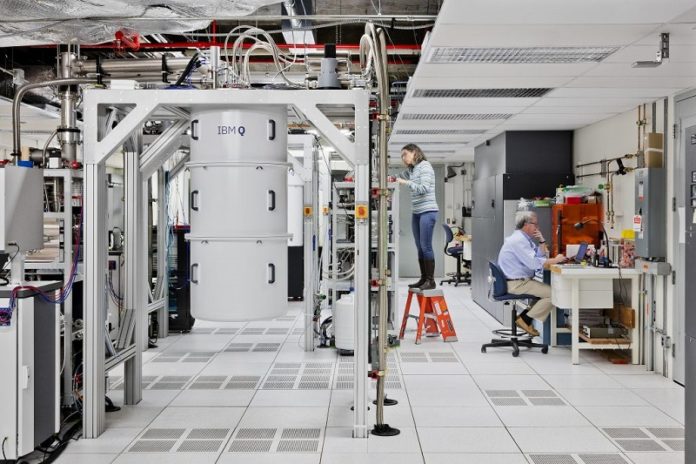Quantum computing may not be an obvious topic for a panel at a Red Hat company event, but in fact quantum computing is very much an open-source project – in fact, it has to be in order to develop the technology.
At last month’s Red Hat Summit 2020 Virtual Experience – which, as the name implies, took place entirely online – panellists spoke about the current state of quantum computing, and all acknowledged the importance of open-source to quantum computing innovation.
“Open source is such a way to fuel innovation and create communities enable people to learn from each other contribute, share and grow,” said Krysta Svore, GM of quantum software at Microsoft. “We’re just at the start of this [quantum computing] journey, so we know that we’re going to have to build a community to really innovate every step along this path towards full scale scalable quantum computing.”
As an example, she continued, last year Microsoft open-sourced its quantum development kit and its programming language Q# (as well as its compiler) to let the community learn, develop and share quantum algorithms in the cloud, resulting in more engagement and development of new application areas and solutions spanning multiple industries.
Open-source also enables developers to try out different hardware – which is key, because there are a number of different approaches to quantum hardware, particularly in terms of how to develop stable qubits. For example, Microsoft is investing in topological qubits, while Honeywell and IonQ use trapped ion technology, and IBM and Quantum Circuits Inc (QCI) use superconducting qubits.
“So, for example, in Azure Quantum, you can access an trapped ion quantum computer from Honeywell or IonQ, and then also access a superconducting qubit quantum computer from QCI, all in one open ecosystem with one piece of code written in Q#,” Svore said.
Dario Gil, director of IBM Research, agreed, saying open-source was central to its development of its IBM Quantum Experience program and its Qiskit SDK.
“Some of the most significant contributions to Qiskit come from our community,” Gil said. “We have students who are adding new mechanisms for routing quantum circuits onto devices, to give an example, and researchers who show us how to improve the way that their domains – including ML and other areas – can be integrated into the open source effort.”
This approach is also helpful for enterprises who may have a need for quantum computing but have no idea where it would be most useful and at what point it should be integrated into the development cycle, said Honeywell Quantum Solutions president Tony Uttley.
“It’s actually one of the reasons we went into quantum computing – we believe absolutely our businesses are going to be profoundly impacted by its applications,” Uttley said. “When you think of almost any company, the development cycle for trying to integrate any new technology into your business system is oftentimes measured in years, so you really have to plot out when you can insert something like quantum computing into your business enterprise. And so what everybody is doing today [with open-source quantum computing] is testing out some of these paths to value creation.”
In this case, Uttley added, quantum-computing communities are shrinking massive, scalable computing problems down to fit on existing quantum hardware, thus enabling businesses to scale up from there, which in turn gives them a better idea of when they can insert it into their systems and what parts of their enterprise architecture and processes may have to change to be able to take full advantage of quantum computing.
Just another xPU
That said, all panellists cautioned that this doesn’t mean quantum computing is eventually going to replace classical computing for enterprises (or anyone else).
“Quantum computers are not simply faster classical computers, and they’re not going to replace them,” Gil of IBM said. “There will always be problems where you use classical computers, even in the future, and will continue to do so because how efficiently classical machines are designed to implement those problems.”
Gil explained that the key properties of quantum computers – superposition and entanglement – are what allow them to handle the kinds of problems that classical computing can’t, which can be generalized into three foundational areas: general linear algebra (the foundation for building machine learning and AI), graph problems (the heart of optimization) and simulating nature at the quantum level for developing new materials and new drugs.
Examples of quantum-specific problems include simulation of carbon capture processes and artificial fertilizer production, said Krysta Svore of Microsoft. “These problems take longer than the lifetime of the universe to simulate on classical computing, and we can now solve them and simulate them in a matter of weeks on a quantum computer.”
Meanwhile, quantum computers are so good at optimization problems that they can actually produce models to make classical computers more efficient, she added. “We can take those concepts, map them to classical hardware today and achieve some improvements – as an example, with one of our partners, Case Western Reserve University, we’ve been able to speed up MRI scans and make them three times faster.”
“The future of computing is not just about classical machines or AI or quantum. It’s really their combined power,” Gil said. “It’s about bits plus neurons plus qubits coming together.”
Uttley of Honeywell added that it’s helpful to think of quantum computers as another form of processor, like CPUs and GPUs. “If you’re trying to unpack a problem where there are parts of that problem that could be best solved with CPUs, and parts that could be best solved with GPUs, there are going to be parts of those problems that are going to be best solved with a ‘QPU’, a quantum processing unit. And I wouldn’t even rule out that there are likely to be some technologies where different kinds of quantum computers might solve parts of problems more efficiently than others.”
















